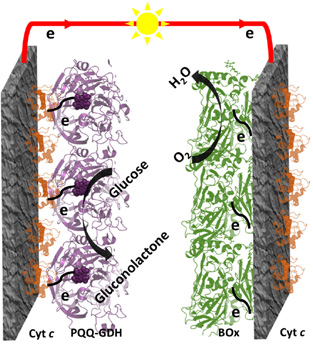Miniaturized implantable and self-sustained power supplies for personalized medical devices – based on energy conversion or energy storage – hold significant promise for monitoring and controlling human health and well-being. Biological power sources, such as biofuel cells and biosupercapacitors that can produce electrical power directly from fuels in biological fluids, or store charge using biodegradable catalysts (e.g. enzymes), have therefore attracted great interest.
The aim of this Ph.D. project is to fabricate novel type biological power sources using enzymes or proteins to convert chemical energy to electrical energy or to store electrical charge. The core redox enzyme pyrroloquinoline quinone dependent glucose dehydrogenase (glucose oxidization) and the copper enzyme bilirubin oxidase (dioxygen reduction) were chosen as target enzymes. The enzymes were immobilized on paper electrodes prepared from the conducting 2D-material graphene as anode and cathode, respectively. Combining the two enzyme electrodes into an electrical circuit with fuel supply directly from the body’s own liquids then enables generating electricity as an enzymatic biofuel cell. Further integrating the redox protein cytochrome c on both electrodes as a chargestoring component, a fully operating self-charging biosupercapacitor was fabricated.

Schematic representation of the assembled ESBC. The structures of cyt c (rust red), PQQ-GDH (purple) and BOx (green) correspond to PDB 1hrc, 1c9u and 2xll, respectively. Not drawn to scale.